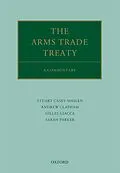The United Nations Arms Trade Treaty became binding international law in late 2014, and although the text of the treaty is a relatively concise framework for assessing whether to authorize or deny proposed conventional weapons transfers by States Parties, there exists controversy as to the meaning of certain key provisions. Furthermore, the treaty requires a national regulatory body to authorize proposed transfers of conventional weapons covered by the treaty, but does not detail how such a body should be established and how it should effectively function. The Arms Trade Treaty: A Commentary explains in detail each of the treaty provisions, the parameters for prohibitions or the denial of transfers, international cooperation and assistance, and implementation obligations and mechanisms. As states ratify and implement the Treaty over the next few years, the commentary provides invaluable guidance to government officials, commentators, and scholars on the meaning of its contentious provisions. This volume describes in detail which weapons are covered by the treaty and explains the different forms of transfer that the Arms Trade Treaty regulates. It covers international human rights, trade, disarmament, humanitarian law, criminal law, and state-to-state use of force, as well as the application of the treaty to non-state actors.
Autorentext
Andrew Clapham is the Professor of Public International Law at the Graduate Institute of International Studies, Geneva. Before he joined the Graduate Institute of International Studies Institute in 1997, he was the Representative of Amnesty International to the United Nations in New York. He represented the International Commission of Jurists at the UN diplomatic conferences that negotiated the Arms Trade Treaty. Stuart Casey-Maslen is an international lawyer specializing in use of force. He is an Honorary Research Associate at Bristol University's School of Law, a consultant with the Institute for International and Comparative Law at the University of Pretoria, and a consultant on international law with the non-governmental organization, Norwegian People's Aid, on conflict preparedness and protection. He served as a legal advisor to the Swiss delegation at the UN diplomatic conferences that negotiated the Arms Trade Treaty. Gilles Giacca is Legal Advisor at the Arms Unit of the ICRC. He was formerly a Research Fellow at the Law Faculty and co-ordinator of the Oxford Martin School Human Rights for Future Generations programme. He represented the NGO Trial at the UN diplomatic conferences that negotiated the Arms Trade Treaty. Sarah Parker is a senior researcher with the Small Arms Survey. She served as an advisor on the Australian delegation throughout the Arms Trade Treaty negotiations and was the consultant to the Chair of the Arms Trade Treaty during the Open-Ended Working Group in 2009.
Inhalt
- Introduction
- The international trade in conventional arms: trends and dynamics
- The impact of illicit and unregulated trade in conventional arms
- A historical overview of the legal regulation of the trade in conventional weapons
- Preliminary discussions
- Preparatory Committees
- The negotiation of the Arms Trade Treaty
- Adoption and Entry into force of the ATT
- Commentary
- The Title
- The Preamble and Principles of the ATT
- Core Provisions
- Final Clauses
